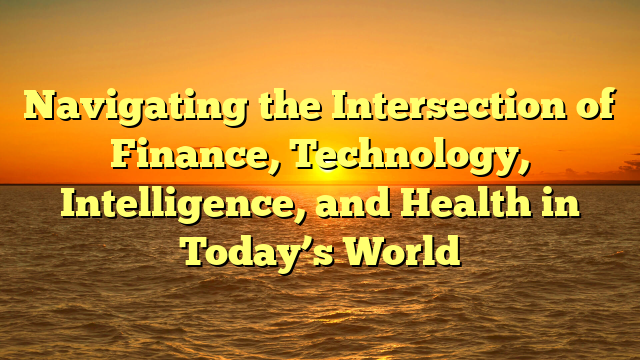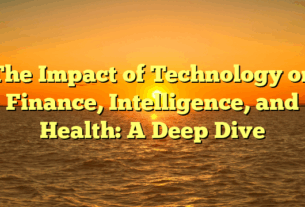Introduction
In today’s world, the interplay between finance, technology, intelligence, and health has become increasingly significant. This article explores how each of these sectors contributes to the modern world and how their development is shaping our future.
Section 1: The Rise of Modern Finance
The landscape of finance has changed dramatically, with technology playing a pivotal role in its evolution. Traditional methods of banking and investing are being replaced by digital platforms that offer greater accessibility, efficiency, and security.
One of the most notable changes in finance is the rise of cryptocurrency. These digital assets are changing the way we view money, investments, and financial systems. Blockchain is revolutionizing the way transactions are conducted, offering a secure, transparent, and decentralized method of exchanging assets.
Fintech startups have revolutionized personal finance by providing easy-to-use apps for budgeting, investing, and banking. These companies leverage AI and machine learning to offer personalized financial advice, making it easier for individuals to make informed decisions about their money.
Section 2: The Impact of Technology on the Modern World
In recent years, technology has drastically altered the way we live and work, introducing innovations that were once unimaginable. The development of artificial intelligence (AI), big data, and the internet of things (IoT) has changed the way businesses operate and how individuals interact with technology.
AI technology is becoming a cornerstone of innovation in fields like healthcare, transportation, and customer service. AI systems can now analyze massive datasets to detect patterns, predict outcomes, and automate tasks, resulting in increased efficiency and productivity.
Another major technological development is the Internet of Things (IoT), which connects devices and systems to the internet. This connectivity allows for real-time data collection and monitoring, which leads to improved decision-making and enhanced operational efficiency.
The development of 5G technology promises to further transform the digital landscape.
Section 3: The Role of Intelligence in Human Advancement
The development of artificial intelligence and human cognitive abilities is at the core of innovation in the modern world.
AI is being integrated into various sectors, from autonomous vehicles to personalized healthcare, offering solutions that were once unimaginable. With machine learning algorithms, AI can improve its performance over time by learning from data, enabling more accurate predictions and more effective solutions.
Despite the rapid rise of AI, human intelligence still plays an irreplaceable role in decision-making, creativity, and complex problem-solving. Cognitive abilities such as critical thinking, emotional intelligence, and problem-solving are essential for navigating the challenges of the modern world, especially as we face global issues like climate change, inequality, and geopolitical instability.
In many cases, AI and human intelligence are working together, combining the strengths of both to drive innovation and progress.
Section 4: The Intersection of Health and Technology
Health technology is changing the way healthcare is delivered, making it more personalized, efficient, and accessible.
Wearable devices, such as fitness trackers and smartwatches, have empowered individuals to take charge of their health.
Telemedicine, the practice of providing medical care remotely via technology, has grown significantly in the wake of the COVID-19 pandemic. This technology has been a game-changer, especially in rural areas where access to healthcare providers may be limited.
situs bandar bola terpercaya tahun ini 2025 in healthcare is being used for predictive analytics, patient monitoring, and the development of precision medicine, leading to more effective treatments.
Conclusion
The continued growth of finance, technology, intelligence, and health will undoubtedly shape the future, bringing about new challenges and opportunities. The advancements in these sectors offer tremendous potential to improve our quality of life, but they also raise important ethical and societal questions. As we move forward, it will be crucial to balance innovation with responsibility to ensure a future that benefits everyone.



